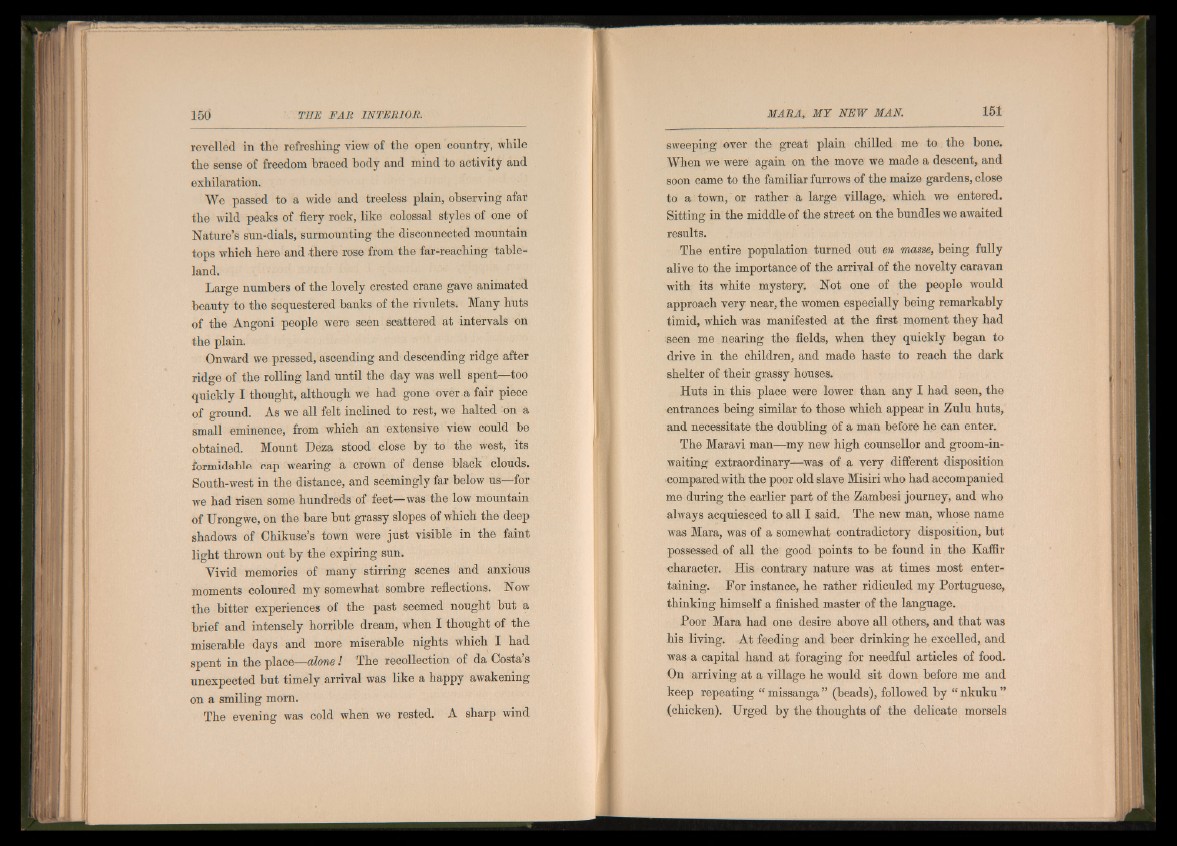
revelled in the refreshing view of the open country, while
the sense of freedom braced body and mind to activity and
exhilaration.
We passed to a wide and treeless plain, observing afar
the wild peaks of fiery rock, like colossal styles of one of
Nature’s sun-dials, surmounting the disconnected mountain
tops which here and there rose from the far-reaching tableland.
Large numbers of the lovely crested crane gave animated
beauty to the sequestered banks of the rivulets. Many huts
of the Angoni people were seen scattered at intervals on
the plain.
Onward we pressed, ascending and descending ridge after
ridge of the rolling land until the day was well spent—too
quickly I thought, although we had gone over a fair piece
of ground. As we all felt inclined to rest, we halted on a
small eminence, from which an extensive view could be
obtained. Mount Deza stood close by to the west, its
formidable cap wearing a crown of dense black clouds.
South-west in the distance, and seemingly far below us—for
we had risen some hundreds of feet—was the low mountain
of Urongwe, on the bare but grassy slopes of which the deep
shadows of Chikuse’s town were just visible in the faint
light thrown out by the expiring sun.
Yivid memories of many stirring scenes and anxious
moments coloured my somewhat sombre reflections. Now
the bitter experiences of the past seemed nought but a
brief and intensely horrible dream, when I thought of the
miserable days and more miserable nights which I had
spent in the place—alone ! The recollection of da Costa s
unexpected but timely arrival was like a happy awakening
on a smiling morn.
The evening was cold when we rested. A sharp wind
sweeping over the great plain chilled me to the bone.
When we were again on the move we made a descent, and
soon came to the familiar furrows of the maize gardens, close
to a town, or rather a large village, which we entered.
Sitting in the middle of the street on the bundles we awaited
results.
The entire population turned out en masse, being fully
alive to the importance of the arrival of the novelty caravan
with its white mystery. Not one of the people would
approach very near, the women especially being remarkably
timid, which was manifested at the first moment they had
seen me nearing the fields, when they quickly began to
drive in the children, and made haste to reach the dark
shelter of their grassy houses.
Huts in this place were lower than any I had seen, the
entrances being similar to those which appear in Zulu huts,
and necessitate the doubling of a man before he can enter.
The Maravi man—my new high counsellor and groom-in-
waiting extraordinary—was of a very different disposition
compared with the poor old slave Misiri who had accompanied
me during the earlier part of the Zambesi journey, and who
always acquiesced to all I said. The new man, whose name
was Mara, was of a somewhat contradictory disposition, but
possessed of all the good points to be found in the Kaffir
character. His contrary nature was at times most entertaining.
For instance, he rather ridiculed my Portuguese,
thinking himself a finished master of the language.
Poor Mara had one desire above all others, and that was
his living. At feeding and beer drinking he excelled, and
was a capital hand at foraging for needful articles of food.
On arriving at a village he would sit down before me and
keep repeating “ missanga ” (beads), followed by “ nkuku ”
(chicken). Urged by the thoughts of the delicate morsels